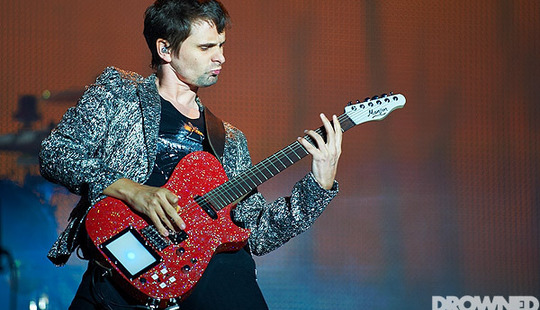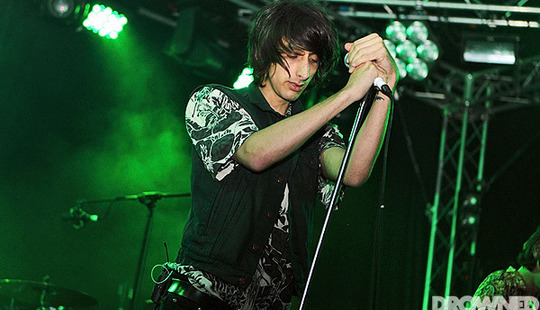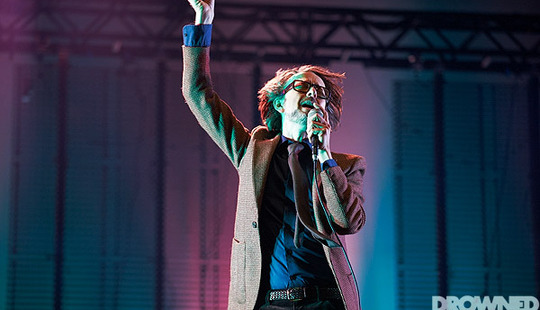Leeds In Summary
Combined with teenage excursions, when travelling down from the bleak North East to the slightly less bleak Yorkshire, this was my fifth Leeds weekend. Of course in those early days, between 2004 and 2006 where I was but a sprightly 16 to 18 years old respectively, it was the best thing ever – the abandonment of living by your parents' rules, the chance to get royally smashed underage; yeah all those clichéd things that pubescent lads are well up for. In 2011 that aspect of the festival remains pretty much undimmed as far as I can see, and it’s not something I look upon with rose-tinted spectacles. Coming from Green Man, where everything was made just so, from wooden models of animals placed around its woodland areas, to the array of quality food vendors, is was the opposite of an even that seemed to strive to make for the most unique experience possible. To career around the Leeds site though is still to find yourself in almost any major festival in Europe, a walk from the NME/Radio 1 Tent at the top of the site to the Main Arena at the bottom giving a sense of déjà vu; shit burger van, toilet, bar, shit burger van etc etc etc.
But of course you don’t come to a weekend like this to sample cuisine; and it’s seeing someone like The Antlers captivate a full Festival Republic tent that brings home how, despite the lowest common-denominator feel of this weekend, this is a chance for bands to cross over to those who might’ve otherwise gone nowhere near them in a massive massive way. At the risk of sounding patronising, it’s easy to forget that acts like American group, and the likes of And So I Watch You From Afar and even Fucked Up aren’t really that big a deal for a lot of people. These days I’m lucky enough that I receive rather a lot of music from acts large and small nationwide via post and email; back in 2004 when I went to Leeds at 16 I don’t think I’d heard a note of LCD Soundsystem’s music before seeing them in the Dance Tent that year. It’s all too easy to forget that for many artists this is probably the largest crowd they’ll have ever played in front of in Britain – a storming performance here and they’re probably set up for a good Autumn tour; ultimately an artist wants to become bigger and more successful and this is the perfect platform for it - a smattering of those who'd consider themselves "in the know" and many who are out for the jolly and who might just pick up something new amidst the boozing on the way.
So congratulations to Fucked Up, who played to a packed NME/Radio 1 Tent and made the giant tent feel as intimate as any of their sweat-dripping club shows, kudos to The Joy Formidable who didn’t shirk their responsibilities of waking up the Main Stage one bit, and a big doff of the cap to The Horrors who dragged a more than sizeable number of people away from My Chemical Romance and Liam Gallagher’s Beady Eye respectively. Leeds and Reading weekend suffers its criticisms, but at the root of it still lies its greatest asset; bringing the best music on the verge of the mainstream together, before giving it the final push across that barrier.
Our Top 3 Highlights

Muse
For me my Friday was sealed by the first hour of Muse, something that rather surprisingly didn’t seem to be the popular opinion. Indeed, as they roared through Origin Of Symmetry in its entirety, many fresh of face pushed back through past me, moving away from the Main Stage. Initial annoyance has given way to reflection; after all, most of those heading off would have been has young as six when the group’s second album came out in 2001 and the fact of the matter is the crowd at Leeds is young, that's never changed. How Pulp got away with it owed to the omnipresence of their songs and how they’ve become ingrained in our music culture; Muse have never really had that, certainly not until last year’s The Resistance and parts of Black Holes & Revelations, that’s why those first Wembley headlining shows in 2007 were such a surprise; the trio had got to that stage without ever really crossing into the public conscience that others had. So it is then that tracks like ‘Microcuts’ and ‘Screenager’ fall on deaf ears.
Did that matter though? Does it buggery, you see if you looked closely you could see drummer Dom Howard and bassist Chris Wolstenholme looking more invigorated than they had for years; the latter’s always drawn attention for his head nodding, but here he seemed ready to explode, whilst Howard battered his kit with unhinged aggression, the pair an infinitely more satisfying focus point these days than Bellamy - who looks ever more tired as his band age. Not that he’s was without his charms either, the trio – and that’s a key word as off-stage keyboardist Morgan Nicholls doesn’t appear for any of the Origin… material – locked together in cohesion, throwing shards of noise at each other as a true three-piece for the first time in half a decade. ‘Space Dementia’ was monumental, that piano composition taking me back to teenage bedrooms and sore hands as I tried again and again to faithfully replicate it, ‘Hyper Music’ is one of their forgotten bangers – a crunching metal assault that deserves a place in their every set – and ‘Citizen Erased’ still feels like the blueprint for all they would eventually go on to do, a multi-segmented emotional whirlwind that brings the heavens down with a ostentatious thud.
So the crowd might have greeted ‘Uprising’ with rapture, so they might even have afforded the frankly terrible ‘Undisclosed Desires’ a more-than-generous reception upon its appearance - this was to be expected. For the first hour, from when Tom Waits uttered “what’s he building in there?” Just as he did ten years ago, through to ‘Megalomania’s’ pall-bearing finale, this was Muse recalling a time in their life when their musical dexterity, insatiable desire and reckless youthful disregard suggested they could reach whatever level they wanted to. Now they have; it’s just that at Leeds they reminded us what they’d compromised to get there. By Simon Jay Catling

The Horrors
Having survived the inevitable downpour of rain, ensuing quagmire of mud and sleepless nights both self-inflicted by copious amounts of birthday alcohol and otherwise inflicted ketamin-addled nutters camping nearby, it would be fair to say this year's Leeds Festival through up numerous highlights. Indeed, limiting it to just two was something of a sifting process worthy of a highbrow recruitment assessment at senior managerial level. Whilst examining the candidates - Muse gloriously reaffirming why A) 'Origin Of Symmetry' still remains their best record a decade after its release; and B) they're possibly the greatest stadium rock band of the 21st Century. Cerebral Ballzy kicking the arse out of Saturday afternoon and its daydreaming punters with a twenty-minute short, sharp, shock that brought the spirit of 1981 fighting and screaming through a thirty-year timezone. Or even The National's elevation to genuine stadium rock status courtesy of their steep placing on Sunday evening's mainstage bill, even if early set nerves had threatened to engulf the party in uneasy tension before it got going. There were two moments of sheer, unadulterated greatness however that ruled over all else on display this weekend, and in some ways pretty much everything else this festival veteran has witnessed all summer. The resurrection of Pulp as a major force to be reckoned with on Sunday night couldn't have been eclipsed by any headliner on the planet. If there was a more perfect way to end a festival, then I've yet to see it. Nevertheless, the first major highlight for me occurred some twenty-four hours earlier.
While it seems almost a pre-requisite these days when commenting on the unprecedented rise of The Horrors, it does seem strange to think that four years ago the Southend five-piece were considered to be little more than a London scene in-joke. A band so wrapped up in garage punk nostalgia they made The Hives seem like Radiohead in terms of innovation, no one outside of the closest confines of their inner circle having any inclination of what was about to follow. If 2009's Primary Colours sowed the seeds, then the release of Skying earlier this year proved to be a nutritious germination that marked a 360 degree turnaround for a band many had written off by the tail end of 2007. What's more, their live shows were also becoming more accompished, event-like even such as those reminisced by people fortunate enough to see The Stone Roses during their halcyon period, or Nirvana pre-'Nevermind'. Having already conquered Glastonbury and Field Day regardless of what the television viewers may say (I was there on both occasions) Leeds should have been a triumphant walk in the park. Nevertheless, with obstacles aplenty thanks to some pretty bizarre sceduling (Beady Eye headlining the second stage thereby relegating The Horrors to that of third stage bill toppers) and an unhelpful power cut that would have destroyed many a lesser band to the point of no return only seemed to buoy Faris Badwan and co. onto greater things. Musically taut yet experimental all the way through, their increasingly familiar setlist playing material from both Skying and Primary Colours simultaneously turned the Festival Republic tent into a sweaty, limb flailing mini-rave for a pproximately fifty minutes. 'Changing The Rain' and 'Who Can Say' set the scene to superfluous perfection, 'I Can See Through You' took all and sundry on a psychedelic trip and 'Sea Within A Sea' brought us back down to earth, every single component falling into place like a luminous jigsaw carved from liquidized blotting paper. It threatened to go wrong during 'Still Life' when sound and vision ceased unceremoniously, yet the audience, by now transfixed by what had gone before them, sang its chorus over and over again until power and band returned. At this point Badwan called us "the best crowd we've ever played to" before he and his band continued where they left off. Festivals like Leeds were made for moments such as this. Simply perfect. By Dom Gourlay

Pulp
When Jarvis Cocker announced in February that Pulp would be reforming and playing several festivals, no one could have predicted such a triumphant return. If their appearance at Primavera was something of an aperitif and their not-so-secret show on the Other Stage at Glastonbury a post-dinner cocktail of champagne of orangeade, then this could be described as having all three courses served as one. The neon sign from the cover of 'Pulp:Intro' and many of their subsequent releases lit up, and the currently seven-strong line-up emerged from the shadows, with plenty of time for Cocker to engage in a little pre-gig banter before 'Do You Remember The First Time?' started proceedings. From there it was a cavalcade of glory that never fell beneath being spectacular at any point. Sure, the set was mainly 'Different Class' heavy but boy, what an array of songs to polish off an exemplary weekend. 'F.E.E.L.I.N.G.C.A.L.L.E.D.L.O.V.E.', a highlight of the comeback shows all summer was once again sublimely executed, while 'Something Changed' and the rarely aired 'Mis-Shapes' both pre-empted mass singalongs out front that at times threatened to drown out la Cocker himself. Even the older material such as 'Razzmatazz' and 'Babies' was joyously received, with the charismatic frontman finding time to berate some poor guy in a bright green jumper, those daring enough to participate in stomach churning fairground rides and even his own musicianship at regular intervals. Before 'This Is Hardcore', Cocker welcomed one-time Pulp member Richard Hawley onto the stage, almost as a way of finalising this grand homecoming and the 'Coles Corner' creator stuck around for the rest of the set, a diminutive 'Sunrise' proving particularly powerful. When Cocker closed the set by asking the audience if anyone was at their first ever festival appearance in the city (the 1995 Heineken Festival - I was) before playing inevitable set closer 'Common People', I swear grown blokes were crying tears of joy into their paper cups of warm lager. Pristine from start to finish and a truly perfect way to bring Leeds Festival 2011 to its conclusion, Pulp's music has an uncanny knack of uniting generations, which I guess is what these kind of events are meant to be all about. By Dom Gourlay






















